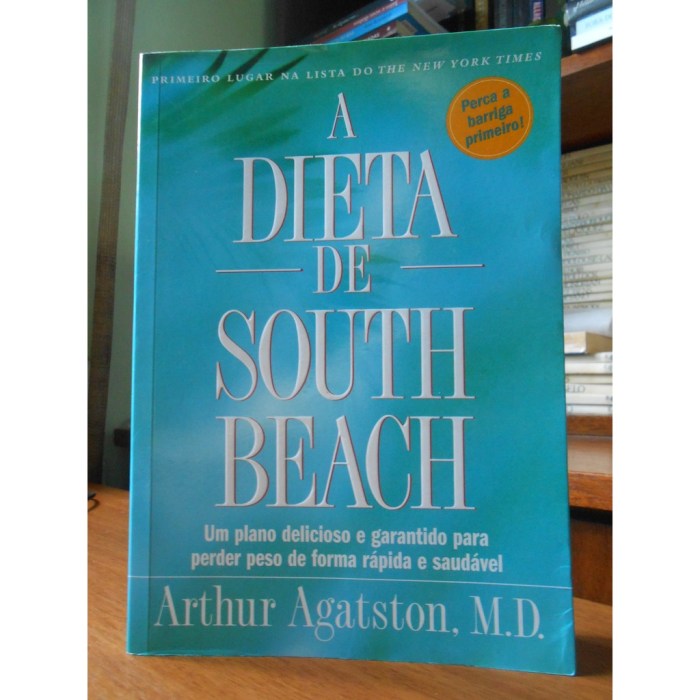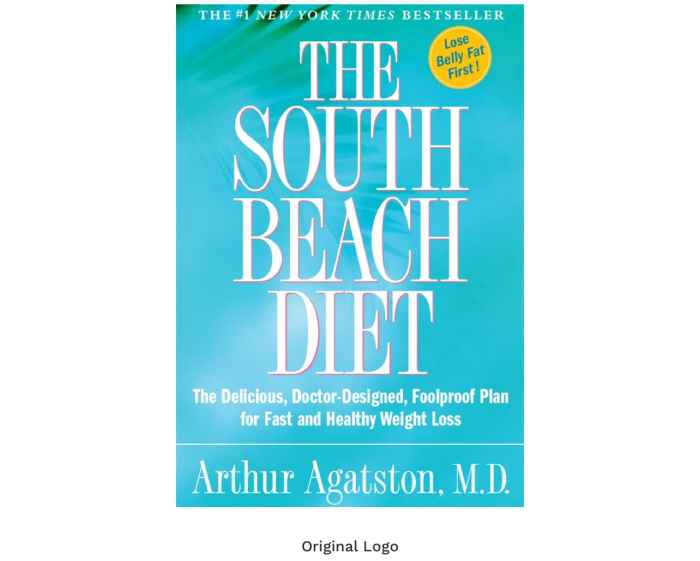Arthur Agatston South Beach Diet – Arthur Agatston’s South Beach Diet isn’t just another fad; it’s a carefully crafted approach to weight loss and improved health, built on a foundation of sound nutritional principles and years of research. This isn’t about deprivation; it’s about making smart food choices that fuel your body and help you reach your goals. We’ll dive deep into the three phases, explore the science behind it, and uncover the truth behind the hype.
From understanding the core principles and Dr. Agatston’s expertise to navigating the practical application and addressing common criticisms, we’ll equip you with the knowledge to make informed decisions about whether the South Beach Diet is right for you. We’ll also look at potential benefits and risks, ensuring you have a complete picture before embarking on this dietary journey.
The South Beach Diet: Arthur Agatston South Beach Diet

The South Beach Diet, created by cardiologist Arthur Agatston, is a popular weight-loss plan that emphasizes healthy eating habits rather than restrictive calorie counting. Unlike many fad diets, it focuses on sustained lifestyle changes that promote long-term weight management and improved cardiovascular health. Its core principles revolve around choosing the right carbohydrates, controlling portion sizes, and prioritizing nutrient-rich foods.
Core Principles of the South Beach Diet
The South Beach Diet’s foundation rests on several key principles. It prioritizes the consumption of “good” carbohydrates – those that are slowly digested and don’t cause rapid spikes in blood sugar – over “bad” carbohydrates, which are quickly digested and can lead to weight gain and other health problems. The diet also emphasizes lean protein sources, healthy fats, and plenty of fruits and vegetables.
Portion control plays a significant role, ensuring that individuals consume appropriate amounts of food to support weight loss without feeling overly deprived. Finally, the diet encourages regular physical activity to further enhance weight loss and overall well-being.
The Three Phases of the South Beach Diet
The South Beach Diet is structured into three phases, each with progressively less restrictive guidelines.Phase 1, the initial two-week period, is the most restrictive. It eliminates all sugary foods, refined carbohydrates (like white bread and pasta), and unhealthy fats. The focus is on stabilizing blood sugar levels and jumpstarting weight loss. Phase 2, which can last for several months, gradually reintroduces some healthy carbohydrates, like whole grains and fruits, while continuing to limit unhealthy choices.
This phase focuses on sustained weight loss and establishing healthy eating habits. Finally, Phase 3 represents the maintenance phase. It involves incorporating a wider variety of foods, including some previously restricted items, but emphasizes mindful eating and portion control to prevent weight regain.
Comparison with Other Popular Diets
The South Beach Diet differs significantly from other popular weight-loss approaches. Unlike extremely low-calorie diets, the South Beach Diet emphasizes balanced nutrition and does not severely restrict calorie intake. Compared to low-carb diets like Atkins, it allows for a more moderate intake of carbohydrates, particularly in later phases. It differs from the Mediterranean diet primarily in its stricter initial phase and more structured approach to carbohydrate reintroduction.
While sharing some similarities with the DASH diet in its emphasis on fruits, vegetables, and lean protein, the South Beach Diet places a stronger focus on carbohydrate selection and the phased approach to weight loss.
Allowed and Restricted Foods in Each Phase
The following table summarizes the allowed and restricted foods in each phase of the South Beach Diet. Note that this is a simplified representation, and individual needs may vary. Always consult with a healthcare professional before starting any new diet.
| Phase | Allowed Foods | Restricted Foods |
|---|---|---|
| Phase 1 | Lean protein (fish, chicken, beans), leafy greens, non-starchy vegetables, healthy fats (olive oil, avocados), nuts and seeds (in moderation) | Sugary drinks, refined carbohydrates (white bread, pasta, pastries), processed foods, unhealthy fats (trans fats, saturated fats), fruit juices |
| Phase 2 | All Phase 1 foods + whole grains (brown rice, quinoa), most fruits (in moderation), some legumes | Most processed foods, sugary drinks, excessive amounts of unhealthy fats |
| Phase 3 | Most foods in moderation, focusing on healthy choices and portion control | Foods that trigger weight gain for the individual |
Dr. Arthur Agatston’s Role and Expertise

Dr. Arthur Agatston is a prominent cardiologist and the creator of the South Beach Diet, a popular weight-loss program known for its focus on healthy fats and controlled carbohydrate intake. His expertise lies in the intersection of cardiovascular health and dietary interventions, making him a key figure in the field of preventative medicine. This section delves into Dr.
Agatston’s background, contributions, and the scientific underpinnings of his dietary approach.Dr. Agatston’s career has been significantly shaped by his dedication to improving cardiovascular health. He’s not just a theorist; his work is deeply rooted in practical application and patient care. His innovative approach to weight management, as embodied in the South Beach Diet, has garnered significant attention and influenced the way many approach healthy eating and weight loss.
Understanding his background and the scientific basis of his diet is crucial to evaluating its effectiveness and relevance.
Dr. Arthur Agatston: A Biographical Overview
Dr. Arthur Agatston is a board-certified cardiologist with extensive experience in interventional cardiology. He received his medical degree from the University of Miami School of Medicine and completed his cardiology fellowship at the University of Miami. Beyond his clinical practice, Dr. Agatston has dedicated significant time to research and the development of innovative approaches to cardiovascular health.
His work has consistently focused on the prevention and treatment of heart disease, a leading cause of mortality worldwide. His publications and presentations at medical conferences reflect his continuous commitment to advancing the field of cardiology.
Contributions to Cardiology and Weight Management
Dr. Agatston’s contributions extend beyond the South Beach Diet. He’s a prolific author, having written several books on cardiovascular health and weight management. His work emphasizes the importance of lifestyle modifications, particularly dietary changes, in preventing and managing heart disease. The South Beach Diet itself is a testament to his belief that a carefully planned diet can significantly impact cardiovascular risk factors, including blood pressure, cholesterol levels, and weight.
He has consistently advocated for a balanced approach that combines dietary adjustments with regular exercise and stress management. His influence on public health is undeniable, as the South Beach Diet has become a widely adopted weight-loss strategy.
Scientific Basis of the South Beach Diet
The South Beach Diet is not simply a fad; it’s based on a scientific understanding of the body’s metabolic response to different types of food. The diet emphasizes the consumption of healthy fats, lean protein, and non-starchy vegetables while limiting refined carbohydrates and sugary foods. This approach is rooted in the concept of glycemic index (GI) and glycemic load (GL), which measure how quickly carbohydrates raise blood sugar levels.
By restricting foods with a high GI/GL, the diet aims to stabilize blood sugar, reduce insulin resistance, and promote weight loss. Furthermore, the diet’s emphasis on healthy fats provides satiety and helps to regulate hormone levels associated with appetite and metabolism. While the South Beach Diet hasn’t undergone extensive large-scale randomized controlled trials, numerous observational studies and smaller trials support its efficacy in promoting weight loss and improving cardiovascular risk factors.
The scientific rationale behind the diet is well-established within the context of current nutritional understanding.
A Short Biography of Dr. Arthur Agatston
Dr. Arthur Agatston, a leading figure in cardiology, is best known for creating the South Beach Diet. His medical expertise, coupled with his focus on preventative measures, led to the development of this popular weight-loss plan. A key achievement is his successful translation of complex medical knowledge into an accessible and effective dietary approach. His numerous publications and books have made significant contributions to public health education, empowering individuals to take control of their cardiovascular health through dietary modifications.
His enduring legacy lies in his ability to bridge the gap between medical science and practical dietary advice.
Criticisms and Controversies
The South Beach Diet, while popular, hasn’t escaped criticism. Concerns have been raised regarding its long-term sustainability, potential health risks, and the validity of some of its claims. This section will examine these criticisms and controversies, offering diverse perspectives from nutritional experts.
Common Criticisms of the South Beach Diet
Several criticisms consistently emerge regarding the South Beach Diet. Some experts argue that its restrictive nature, particularly in the initial phases, can lead to nutrient deficiencies if not carefully managed. The emphasis on certain food groups might also exclude valuable nutrients found in other foods. Furthermore, the diet’s long-term efficacy is questioned; many find it difficult to maintain the dietary restrictions indefinitely, leading to weight regain.
The potential for unsustainable lifestyle changes, rather than sustainable healthy eating habits, is a key area of concern. Finally, the cost associated with purchasing specific South Beach Diet-branded products can be a significant barrier for some individuals.
Expert Opinions on Effectiveness and Safety
The South Beach Diet’s effectiveness and safety have been subjects of debate among nutritional experts. While some acknowledge its potential for short-term weight loss, citing the initial restriction of carbohydrates, others express concern about its potential to cause nutrient deficiencies if followed improperly. Many nutritionists advocate for balanced, whole-food diets that prioritize nutrient density over restrictive approaches. The long-term sustainability of the diet is a recurring point of contention, with some experts arguing that restrictive diets are less likely to lead to sustained weight management compared to lifestyle changes that incorporate balanced nutrition and regular physical activity.
The lack of extensive, long-term clinical trials focusing solely on the South Beach Diet also limits conclusive scientific support for its efficacy.
Controversies Surrounding Claims and Marketing, Arthur Agatston South Beach Diet
The marketing surrounding the South Beach Diet has also faced scrutiny. Some critics argue that the diet’s claims of rapid weight loss and significant health benefits are overstated or lack sufficient scientific backing. The emphasis on specific branded products, which can be more expensive than comparable alternatives, raises concerns about potential conflicts of interest and undue influence on consumer choices.
While Dr. Agatston’s credentials as a cardiologist lend credibility, the lack of independent, large-scale studies supporting all the diet’s purported benefits fuels skepticism. The absence of transparency regarding the financial incentives linked to the diet’s marketing further contributes to the controversy.
Comparison with Other Low-Carbohydrate Diets
| Diet | Carbohydrate Restriction | Focus | Potential Drawbacks |
|---|---|---|---|
| South Beach Diet | Moderate to low, phased approach | Heart health, weight loss | Potential nutrient deficiencies, cost of branded products, long-term sustainability |
| Atkins Diet | Very low, initial phase | Rapid weight loss | Potential nutrient deficiencies, high saturated fat intake, “keto flu” |
| Ketogenic Diet | Very low (<50g/day) | Ketosis for weight loss | Potential nutrient deficiencies, “keto flu”, potential long-term health effects |
| Paleo Diet | Moderate, depending on implementation | Whole, unprocessed foods | Can be restrictive, potential nutrient deficiencies if not planned carefully |
Ultimately, the Arthur Agatston South Beach Diet offers a structured approach to weight management that emphasizes healthy eating habits and sustainable lifestyle changes. While it’s not a miracle cure, its focus on balanced nutrition and gradual weight loss can be effective for many. Remember, individual results vary, and consulting with your doctor or a registered dietitian before starting any new diet is always recommended.
The key takeaway? Informed choices lead to better outcomes.

